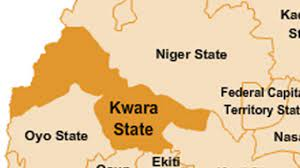
Reported by: Ime Richard Aondofa | Edited by Henry Owen
Kwara State is once again in mourning after a brutal attack in Oke-Ode left several innocent lives—including community vigilantes and the Baale of Ogbayo—tragically cut short. The incident, reportedly carried out by armed bandits, has sent shockwaves across the nation, reigniting concerns over escalating insecurity and the urgent need for comprehensive national action.
Reacting to the tragedy, former presidential candidate Peter Obi expressed deep sorrow and solidarity with the victims’ families. “It is with a heavy heart that I received the news of the tragic killings in Oke-Ode, Kwara State, where innocent lives, including vigilantes and the Baale of Ogbayo, were cut short in yet another mindless act of violence from armed bandits terrorising our nation,” Obi said. He stressed that Nigerians should not have to live in fear in their own homes, calling for an urgent national security response.
The attack has sparked widespread outrage on social media, with many Nigerians expressing grief and frustration over what they perceive as a persistent failure to curb violence. A Twitter user lamented, “How many more communities must be lost before action is taken? Oke-Ode is not just numbers—it’s people, families, lives.” Another post highlighted the psychological toll on rural communities, noting that repeated attacks are fostering fear and displacement among residents.
Security analysts warn that the Oke-Ode attack is part of a worrying trend of escalating violence in northern and central Nigeria. Dr. Ibrahim Sule, a security studies expert, observed, “These repeated incursions by armed groups underscore systemic gaps in intelligence, coordination, and local law enforcement. Without urgent reforms and adequate deployment of resources, communities remain vulnerable, and the cycle of violence persists.”
Local officials and civil society groups have echoed calls for immediate action. Kwara State Governor AbdulRahman AbdulRazaq condemned the killings and pledged support for affected families, stating that “the government will continue to work tirelessly to ensure security and restore peace to our communities.” Meanwhile, community leaders emphasized the need for coordinated engagement between local vigilantes, law enforcement, and federal security agencies to prevent further loss of life.
Public reaction has also highlighted the broader socio-economic implications of persistent insecurity. Business owners in affected areas warn that repeated attacks disrupt local commerce, agricultural activities, and supply chains, deepening poverty and limiting economic opportunities. Mrs. Funke Adeoye, a trader in nearby Ilorin, noted, “We live in constant fear. Every attack means businesses close, children miss school, and communities lose hope. It is more than just security; it affects our livelihoods and future.”
Analysts argue that high-profile attacks like the one in Oke-Ode not only destabilize local communities but also erode public confidence in government institutions. Dr. Chinedu Okeke, an economist, remarked, “Insecurity has a direct impact on economic growth. Investors are hesitant to commit capital where violence is rampant, infrastructure is vulnerable, and communities live under threat. Addressing security is not just a moral imperative—it is central to Nigeria’s economic stability.”
Peter Obi’s statement resonates with many who believe the national dialogue on security has become urgent and unavoidable. “We cannot continue to normalise tragedy,” Obi said, offering condolences to the grieving families and reassurances to the people of Kwara State. He called on federal and state authorities to take decisive action to protect citizens and restore confidence in public safety.
Civil society groups are now mobilizing to provide immediate humanitarian assistance and to push for policy reforms. Organizations focused on community policing and rural safety emphasize the importance of proactive engagement, suggesting measures such as enhanced intelligence sharing, rapid response units, and investment in early-warning systems.
Meanwhile, ordinary Nigerians continue to share their grief and solidarity online. Hashtags like #OkeOdeTragedy and #EndBanditry have gained traction on social media, signaling widespread public demand for urgent government intervention. Many commentators are also calling for national-level discussions on the root causes of banditry, including poverty, unemployment, and weak institutional frameworks, stressing that long-term solutions must combine security, social, and economic strategies.
The Oke-Ode tragedy is a stark reminder of the persistent security challenges facing Nigeria. As the nation mourns the loss of lives, there is a growing consensus that immediate and sustained action is required to protect communities, restore public confidence, and prevent further escalation. Experts and citizens alike insist that coordinated efforts—ranging from improved policing and intelligence to community engagement and economic empowerment—are essential to breaking the cycle of violence.
In expressing his condolences, Peter Obi offered a message of unity and resilience: “May you find strength and comfort in this difficult time, and may the souls of the departed rest in perfect peace.” His words reflect the collective grief of a nation grappling with insecurity, and the urgent call for solutions that ensure no Nigerian must live in fear in their own homeland.
📩 Stone Reporters News
🌍 stonereportersnews.com | ✉️ info@stonereportersnews.com
📘 Facebook: Stone Reporters | 🐦 X (Twitter): @StoneReportNews


Add comment
Comments